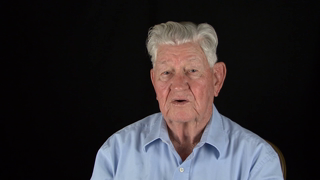5:40 | Near the end of the fighting on Guam, Joseph Hiott experienced two things for the first time. He came under friendly fire and he saw his first tracer bullets. Back on Guadalcanal, his Marine unit trained with tanks to perfect new combined unit tactics.
Keywords : Joseph Hiott Guam friendly fire tracer Guadalcanal tank jungle grenade 29th Marine Regiment 15th Marine Regiment artillery 6th Marine Division

Two days after the attack on Pearl Harbor, Joseph Hiott showed up at the Marine recruiting office. At Parris Island, "the real Marine boot camp," he remembers being rousted at 2 AM to scrub the floor with a bucket of water, a bucket of sand, and a brick. The recruits were constantly berated and told there was no chance they were going to make it as Marines.
The gunnery instructors used a long megaphone so recruits on the firing line could hear them. Joseph Hiott recalls that when a young Marine turned without opening the bolt on his 1903 Springfield rifle, the instructor found another use for the megaphone. At the time, there was no graduation ceremony from boot camp, but it was better than any ceremony when their drill instructor finally smiled.
After boot camp, new Marine Joseph Hiott was assigned to guard duty at the Naval Air Station in Opa-locka, Florida where the crusty old commander told the men they were not yet Marines. One thing that meant was more close order drill, a valuable tool for instilling instant obedience to orders, something vital in combat. Another vital skill was being able to assume command when required.
When Marine Joseph Hiott arrived in Guadalcanal, he was assigned to the 2nd Raider Battalion, a new unit created under orders from Franklin D. Roosevelt, who admired the British Commandos and wanted an American unit to perform special operations. The Raiders, like the enemy, would fight to the death but for a very different reason. They also considered themselves the best of the best and trained accordingly.
Marine Raider Joseph Hiott's first battle was at Bougainville and his job was demolitions. Blowing up enemy emplacements was his responsibility, as well as setting perimeter traps. He admired the riflemen on the line because they were the ones doing the primary work.
After the Battle of Bougainville, the Marine Raiders were folded into the 4th Marine Regiment. Joseph Hiott says they all felt they were still Raiders. After several hard fought battles, there weren't many of them left. He had to fill in more than once for a superior who was killed or wounded, but he was not promoted. As the unit prepared to invade Emirau, they learned the Japanese garrison had abandoned the island.
It must have been a million rounds from naval guns and planes that pounded Guam, says Marine Joseph Hiott, but when he hit the beach, the Japanese were still there. In fact, he was under fire from the minute he left the ship. A foothold was secured, but it was a horrendous battle when the Japanese counter attacked that first night.
As he advanced across Guam, Marine Joseph Hiott encountered the Japanese "knee mortar." It was an effective weapon, though misnamed, he says. It would break your leg if you set it on your knee. Island fighting in the Pacific meant battling your enemy face to face. In the jungle and mountain terrain, the weaponry was limited to the M-1 rifle, the .30 cal light machine gun, and mortars.
Marine Joseph Hiott was the Platoon Guide, the second ranking NCO, and it was his job to fill in if something happened to the Platoon Sergeant and to provide additional supervision when advancing. The first night on Guam, he encountered a wounded Marine wandering around out of his mind. He got the man back to the aid station and felt good about his chances. Fifty years later he got a surprise.
It was during a heavy Japanese counter attack on Guam that George Cashmore, just an 18 year old kid, was killed on the line. Sgt. Joseph Hiott explains how you can't let death in combat affect you to the point that your effectiveness is lessened. It's war and people will die. You know that and keep going.
Joseph Hiott's unit was combined with others to make the 6th Marine Division, a self sufficient force. He had deduced through unusual means that the next destination was Okinawa, site of the last land battle of World War II. At the Northern point of the island, a mountain gun emplacement was outfitted with very large guns, but there were no roads. The Marines had to complete the assault to find the answer to that riddle.
It was on Okinawa that Joseph Hiott was hit by the concussion blast from an artillery shell. He doesn't know how close it landed, but four men further away than him were wounded by shrapnel. Though he was only hit with the concussion, he suffers to this day. Of course, when he was given the choice, the Marine returned to his unit rather than being evacuated.
When Marine Joseph Hiott returned to his unit on Okinawa after recovering somewhat from a concussion, he assumed the job of Platoon Sergeant because that man was a casualty. They made a second landing and pressed on until every single enemy soldier was dead. Before it was over, he was filling in for the Gunnery Sergeant.
After Okinawa was secured, it wasn't long until Japan surrendered. The Marine Corps began tallying up points to schedule men to return home and you needed at least 85 points. Joseph Hiott had 97 and they were hard earned. He sums up his service with a tribute to his fellow Marines, and more especially, his fellow Marine Raiders.